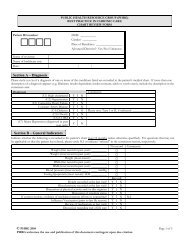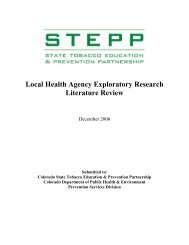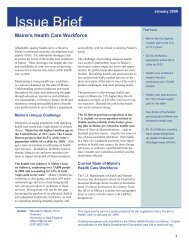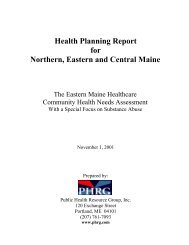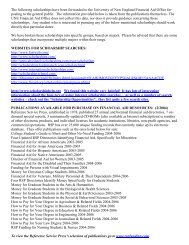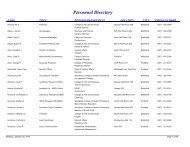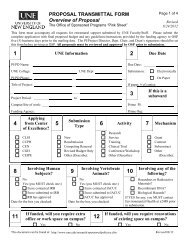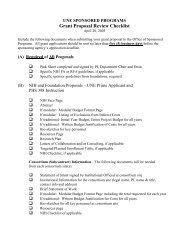National Electronic Disease Surveillance System (NEDSS ...
National Electronic Disease Surveillance System (NEDSS ...
National Electronic Disease Surveillance System (NEDSS ...
You also want an ePaper? Increase the reach of your titles
YUMPU automatically turns print PDFs into web optimized ePapers that Google loves.
<strong>NEDSS</strong> Phase II, Deliverables 1 and 2<br />
Change Control - In Configuration Management, the process by which a change is proposed,<br />
evaluated, approved (or disapproved), scheduled, and tracked. See Change, Change Directive,<br />
Change Impact Assessment, Change Implementation Notice.<br />
Change Control Documents - Formal documents used in the configuration management<br />
process to track, control, and manage the change of configuration items over the systems<br />
development or maintenance life cycle. See <strong>System</strong> Change Request, Change Impact<br />
Assessment, Change Directive, and Change Implementation Notice.<br />
Client/Server - A network application in which the end-user interaction with the system (server)<br />
is through a workstation (client) that executes some portion of the application.<br />
Configuration Control - The process of evaluating, approving or (disapproving), and<br />
coordinating changes to hardware/software configuration items.<br />
Configuration Control Board - The formal entity charged with the responsibility of evaluating,<br />
approving (or disapproving), and coordinating changes to hardware/software configuration<br />
items.<br />
Configuration Item - An aggregation of hardware and/or software that satisfy an end-use<br />
function and is designated by the customer for configuration management; treated as a single<br />
entity in the configuration management process. A component of a system requiring control over<br />
its development throughout the life-cycle of the system.<br />
Configuration Management - The discipline of identifying the configuration of a<br />
hardware/software system at each life cycle phase for the purpose of controlling changes to the<br />
configuration and maintaining the integrity and traceability of the configuration through the<br />
entire life cycle.<br />
Configuration Management Plan - A formal document that establishes formal configuration<br />
management practices in a systems development/maintenance project. See Configuration<br />
Management.<br />
Configuration Status Accounting - The recording and reporting of the information that is<br />
needed to effectively manage a configuration; including a listing of the approved configuration<br />
identification, status of proposed changes to the configuration, and the implementation status of<br />
approved changes. See Configuration.<br />
Contingency Plan - A formal document that establishes continuity of operations processes in<br />
case of a disaster. Includes names of responsible parties to be contacted, data to be restored, and<br />
location of such data.<br />
Conversion - The process of converting (or exchanging) data from an existing system to another<br />
hardware or software environment.<br />
Conversion Plan - A formal document that describes the strategies involved in converting data<br />
from an existing system to another hardware or software environment.<br />
Cost Analysis - Presents the costs for design, development, installation, operation and<br />
maintenance, and consumables for the system to be developed.<br />
Cost-Benefit Analysis - The comparison of alternative courses of action, or alternative technical<br />
solutions, for the purpose of determining which alternative would realize the greatest cost<br />
benefit; cost-benefit analysis is also used to determine if the system development or maintenance<br />
costs still yield a benefit or if the effort should stop.<br />
Cost Estimate - the process of determining the total cost associated with a software development<br />
or maintenance project, to include the effort, time, and labor required.<br />
Criteria - A standard on which a decision or judgment may be based; for example, acceptance<br />
criteria to determine whether or not to accept a system.<br />
PHRG Page 23 of 35 September 28, 2001





